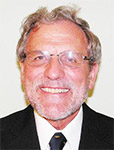Review — JACKSON’S KENYA by Otto Wiegand (Kenya, Paraguay)
PCV Life in Kenya
 Jackson’s Kenya: A Peace Corps Story
Jackson’s Kenya: A Peace Corps Story
Richard Otto Wiegand (Kenya 1970–74, Paraguay 1977–79)
Independently published (www.safari-shamba-books.com), 2020
288 pages
$25.00 (paperback), $9.99 (Kindle)
Reviewed by Robert E. Gribbin (Kenya 1968–70)
•
I have long been awaiting a good Peace Corps memoir from Kenya. At last, one arrived in author Wiegand’s remembering his years in Kenya in the early 1970s. Otto Wiegand was a dairy expert charged with improving animal husbandry in a half dozen of the Settlement Schemes in the trans-Nzoia region between Eldoret and Kitale.

Otto Wiegand
As do most memoirs this one follows a hazy chronological order. The author recounts some events or anecdotes from the ’70s and then updates them with a later observation or comment about how things changed or didn’t. His Kenyan history of what went on around him is broad brushed, and accurate. It is not hard for the reader to put matters into that context.
More to the point, Wiegand’s reminisces about his life in Kenya are chock full of anecdotes about life in rural areas with rural folks. His guide to much of this was a man named Jackson, whom Wiegand employed as a cook, but who subsequently became a friend, Swahili teacher and guide to all things Kenyan – tribalism, corrupt politics, local customs, and culture. Wiegand’s experiences reflected a growing understanding of the environment he was in and with that understanding he became an increasingly effective volunteer. His recitation of the problems that small scale Kenyan farmers encountered clearly illustrated the complexities of economic development in third world countries.
In addition to rural life, Wiegand recounts some of his travels and the young expatriate social context he enjoyed. All PCVs took advantage of East Africa’s magnificent possibilities — high mountains, terrific game parks, gorgeous beaches. The only error of fact I found in the book was geographical. Wiegand swaps the positions of Masaka and Mbarara, Uganda, in telling of a trip there.
In summary, Wiegand does an excellent job of describing the life of a volunteer of that era in Kenya. He writes in a frank, un-hyperbolic fashion that is a pleasure to read.
A disclaimer – I was a PCV in the same part of Kenya in the years just before Wiegand arrived. We never met, but I installed the water systems on several of the Settlement Schemes – Ndalu and Kiminini – he worked as an extension agent. The memoir also mentions several volunteers from my group who hung on after I departed.
•
Reviewer Robert Gribbin built water systems in Kenya as a PCV from 1968 to 1970. Afterwards he became a foreign service officer and served for forty years mostly in Africa, ultimately as ambassador to the Central African Republic and then to Rwanda. In 2014 Gribbin served briefly as charge d’affaires in Sierra Leone during the Ebola crisis.
His books include a memoir published in 2005, In the Aftermath of Genocide – The U. S. Role in Rwanda. More recently he has published the novels The Last Rhino in 2020, and The Serpent of the Nile in 2021.
This review was first published on Robert’s blog Africa Reflections on November 30, 2021, and is printed here with his permission.
Jambo Otto, Delighted to read your book. Delighted to read about your time in Kenya, you are a credit to the Peace Corps and America, if I may say so. Along with PC volunteers Daniel G Ritchie and Leonard Magargee I served as an Agricultural officer covering most of the schemes you mention. These schemes had just started in about 1963 when I was posted there from Kapenguria.
Dan, Len and I became friendly in 1964 and once emails began in about 1989 or earlier the three of us began writing—after I asked PC HQ in NY for their addresses.
Since then we have visited each other in Washington, Philadelphia and here in Castle Douglas where I and wife live.
Would love to exchange a few experiences and ideas—-if you care by email?
Best regards John